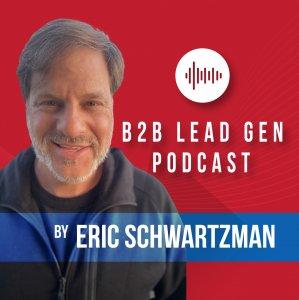B2B Lead Gen Podcast

How To Optimize Your Site for Voice Search
SEMRush CMO Olga Andrienko Discusses Latest Study on Voice Search
Voice search is rising in popularity on mobile devices. Once voice search is enabled on a device, you can use it hands-free and most people do when they’re out and about looking for something.
SEMrush, a popular service SEO consultants use for keyword research and site audits. They recently released a study on Voice Search Optimization.
Olga Andrienko
I spoke with Olga Adrienko, their head of Global Head of Marketing about it and this podcast has everything you need to know to optimize your site for voice search.
About 25% of all searches are voice searches, with half are for local businesses. Optimizing your website to get found by Siri, Alexa, and Google Assistant is a new and evolving SEO specialty skill. Different voice search engines use different algorithms and rely on different source material.
Most local businesses don’t realize it, but if you want to get featured in voice search, you need a presence known in Google’s Local Pack. The Local Pack is the graph that appears in search results listing local businesses. Local Pack powers voice search and look like this.
A Local Pack contains the top three local businesses relevant to your query and getting listed there is a local SEO specialty, which is why local SEO is voice SEO. Schema has no impact on local or voice search.
Voice Search Algorithms
Since 1 in 4 searches are voice searches, voice search optimization is an opportunity for first movers. At this point, people tend to ask different questions to different voice search engines.
Voice search on Google Assistant, Siri, and Alexa use different algorithms. In general, Google Assistant and Siri rely on Google, while Alexa uses Bing.
Locations also come from different sources. Google Assistant uses Google Maps, Siri utilizes Apple Maps, and Alexa uses Yext.
For voice searches about local business reviews, Google Assistant pulls from Local Pack, while Siri and Alexa pull from Yelp.
Getting Featured in Voice Search Results
Local businesses that rank in the top three results Local Pack will appear in voice search results.
When it comes to non local voice search, Google Assistant answers informational queries by reading out loud texts from Featured Snippets. About 12% of all voice search answers from the People Also Ask box. So voice search optimization for informational queries is driven by snippets.
Optimizing for Google involves targeting long-tail keywords, Featured Snippets, and People Ask boxes. For Siri, a local business can update its listing and include additional content to improve its Yelp profile.To learn more about how voice search assistants can drive customers to local businesses, listen to my interview with Olga and subscribe to the B2B Lead Gen Podcast.






 Visit Podcast Website
Visit Podcast Website RSS Podcast Feed
RSS Podcast Feed Subscribe
Subscribe
 Add to MyCast
Add to MyCast